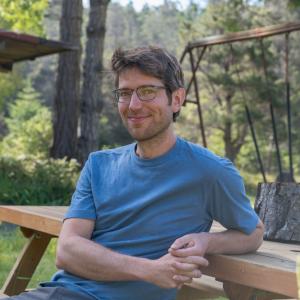Notes from the Director, Summer 2023

William Ratcliff, QBioS Director
A Year of Achievements and Transition: QBioS Reflects on Success and Bids Farewell to Founding Director
As we reflect on an eventful year, QBioS PhD students have continued to excel in research, writing first-author papers in Nature and Science, winning a range of fellowships and research awards, and hosting the 2023 Hands On Modeling Workshop on viral molecular dynamics. However, amidst these achievements, I carry some bittersweet news to share with the community: Founding Director Joshua Weitz is leaving Georgia Tech for the University of Maryland.
It is not an exaggeration to say that QBioS owes its existence to Joshua. A decade ago, he envisioned the potential for an interdisciplinary PhD program in the quantitative biosciences, breaking down disciplinary silos in graduate education and uniting otherwise far-flung groups of scientists at Georgia Tech. QBioS welcomed its first graduate cohort in 2016- among which were two of my own students. To me, QBioS has always been a beacon at Georgia Tech, for its unique approach to graduate education, its academic rigor and ability to provide such excellent quantitative training, and its focus on collaboration and community. However, the effort required to establish and run QBioS in those early years was nothing short of heroic, and Joshua tapped into what appeared to be an endless supply of energy and grit as he overcame the many challenges that inherently arise when one is working across so many different levels of bureaucratic organization.
On a personal note, I am truly saddened to say goodbye to Joshua. He has been an amazing colleague, friend, and leader, freely sharing his most valuable commodity (his time, and laser-like attention) with so many in our community. On the other hand, I am delighted he will be moving to be near family- there simply is no replacement for spending your time with those you love. From all of us in QBioS, we will miss you Joshua! You’ve left Georgia Tech far better off then you found it.
In its infancy, QBioS was heavily dependent on Joshua, and his departure would have severely impacted the program. However, over the last several years, QBioS has matured: we’ve reached a steady state of graduation and enrollment, with alumni forging new industry and academic partnerships, our leadership team expanded as Joshua stepped away from day to day management, and our students have formed a dynamic Student Government Association which organizes events and advocates for student issues. These were all highlighted in our recent once-per-7-year Academic Program Review, which resulted in a glowing evaluation.
As we celebrate the growth of our program, I’d like to highlight some outstanding recent papers by QBioS students. Baxi Zhong, a QBioS student from the 2018 cohort, has examined the physics of locomotion in many-legged critters like centipedes. In first author papers at Science (2023) and PNAS (2023), Baxi introduced a new theory of multilegged locomotion. His team demonstrated that adding more legs to a robot, a concept known as spatial redundancy, enhances its ability to navigate challenging surfaces without additional sensors. This groundbreaking work has potential applications in fields like agriculture, space exploration, and search and rescue.
In another remarkable achievement, Alireza Zamani-Dahaj, part of the 2016 cohort, published a cofirst-author paper in Nature (2023) examining the evolution of multicellularity (read NYT coverage here). Over 3,000 generations of laboratory evolution, his team examined how “snowflake yeast”, a model of nascent multicellularity, adapted as multicellular individuals. Snowflake yeast started out weaker than gelatin, but gradually evolved bodies that were as strong and tough as wood. They accomplished this by evolving to entangle their cells like vines- a subtle shift at the cellular level leading to a profound change at the group level. This project is just the first step in a multi-decadal long evolution experiment examining the origins of multicellularity.
In the realm of community engagement, our first-year Quantitative Biosciences cohort and Associate Director JC Gumbart organized the 7th Annual QBioS Hands-on Modeling Workshop, which highlighted machine learning of viral molecular dynamics. The workshop was open to graduate students, scientists, and faculty members from any field of research and included hands-on tutorials on implementing machine learning algorithms.
Continuing our annual traditions, QBioS students won awards for their research and service to the QBioS Community. Each winner not only received recognition and prize money but also had the opportunity to give a talk at the 2023 QBioS Summer Share. Following the success of last year’s trip, the QBioS SGA also organized another summer retreat at a cabin in the mountains of North Carolina.
As of May 2023, QBioS has 16 alumni, with two more defenses scheduled for summer. Our alumni are currently 100% employed in the careers paths of their choosing, which include postdocs, diverse positions in industry, and teaching. Read more about our alumni here.
As we bid farewell to our Founding Director Joshua Weitz, we reflect on the remarkable growth and achievements of the QBioS program. Our students continue to push the boundaries of interdisciplinary research, contributing to fields as diverse as chemistry, robotics, synthetic biology, neuroscience, microbiology, and evolutionary biology. The strength of our community, exemplified by the active Student Government Association and the numerous awards and fellowships our students have earned, is a testament to Joshua’s success in creating a self-sustaining program. Our alumni, who are pursuing diverse career paths tailored to their individual interests, are making significant impacts across a range of fields. This diversity of career paths highlights the flexibility and breadth of the QBioS program, preparing our graduates not just for employment, but for meaningful careers where they can truly make a difference. As we look forward to the future, we remain committed to fostering a rigorous, collaborative, and innovative environment for quantitative biosciences at Georgia Tech.
Enjoy the rest of your summer everyone!